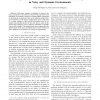Free Online Productivity Tools
i2Speak
i2Symbol
i2OCR
iTex2Img
iWeb2Print
iWeb2Shot
i2Type
iPdf2Split
iPdf2Merge
i2Bopomofo
i2Arabic
i2Style
i2Image
i2PDF
iLatex2Rtf
Sci2ools
ICRA
2007
IEEE
2007
IEEE
Improved Data Association for ICP-based Scan Matching in Noisy and Dynamic Environments
— This paper presents a technique to improve the data association in the Iterative Closest Point [2] based scan matching. The method is based on a distance-filter constructed on the basis of an analysis of the set of solutions produced by the associations in the sensor configuration space. This leads to a robust strategy to filter all the associations that do not explain the principal motion of the scan (due to noise in the sensor, large odometry errors, spurious, occlusions or dynamic features for example). The experimental results suggest that the improvement of the data association leads to more robust and faster methods in the presence of wrong correspondences.
Related Content
| Added | 03 Jun 2010 |
| Updated | 03 Jun 2010 |
| Type | Conference |
| Year | 2007 |
| Where | ICRA |
| Authors | Diego Rodríguez-Losada, Javier Minguez |
Comments (0)

